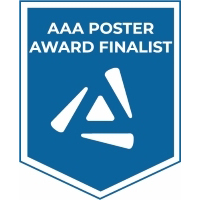Back
ANATOMY
Category: Anatomy
Session: 474 Anatomy Education
(474.11) Assessing Attitudes About Returning to In-person Learning Among Physician Assistant Students Using Q Methodology
Sunday, April 3, 2022
10:15 AM – 12:15 PM
Location: Exhibit/Poster Hall A-B - Pennsylvania Convention Center
Poster Board Number: C11
Introduction: AAA has separate poster presentation times for odd and even posters.
Odd poster #s – 10:15 am – 11:15 am
Even poster #s – 11:15 am – 12:15 pm
Introduction: AAA has separate poster presentation times for odd and even posters.
Odd poster #s – 10:15 am – 11:15 am
Even poster #s – 11:15 am – 12:15 pm
Gregory Wehrman (The University of Tennessee - Knoxville), Elizabeth Agosto (Indiana University School of Medicine), Margaret McNulty (Indiana University School of Medicine), Rebecca Rebman (Indiana University School of Health and Human Sciences), Jessica Byram (Indiana University School of Medicine)
Gregory Wehrman
Presenting Author
The University of Tennessee - Knoxville
Presenting Author(s)
Introduction: The onset of the COVID-19 pandemic resulted in a large shift to virtual learning, particularly in higher education. Now, with many institutions returning to the classroom or a hybrid structure, students are re-adjusting to in-person learning. However, students may have new concerns regarding their education given the ongoing risk posed by COVID-19, particularly social and professional disruptions. In this study, we assess student concerns related to the return to in-person learning among Physician Assistant (PA) students using Q methodology (QM).
Methods: This IRB-approved study had PA students sort and rank a set of 43 statements to which they most strongly disagreed to agreed. Statements were generated to encompass a comprehensive list of concerns PA students may have returning to in-person programming during the COVID-19 pandemic. Students in all cohorts (PA1-PA3) were invited to participate in a survey that included demographic information, a QM sorting activity, and free responses to explain their strongest rankings. The sorts were analyzed using PQMethod 2.35 program and a factor analysis was performed using the recommended settings. Written statements were analyzed using a thematic analysis to assist in interpretation of the QM.
Results: A total of 15 students across all cohorts completed the Q sort (13%). QM sorted the students into one of three statistically significant groups that varied in cohort composition: Employment Concerns (n=6), Social Readjustments (n=5), and Missed Opportunities (n=2). Two students did not load onto a factor. Students in the Employment Concerns group worried about job prospects after graduation and increased risk of COVID-19 exposure and exposing others. Students in the Social Readjustment group were most concerned about changing routine, re-building relationships, and returning to classroom learning. The Missed Opportunities group were concerned about missed time in clinic and networking, and how that might affect jobs. Free responses supported the QM results and indicated participants were most concerned with the pandemic’s impact on future employment across all cohorts. These concerns primarily consist of the availability of positions and perceived negative impacts on their training by future employers.
Discussion: PA students concerns regarding return to in-person instruction transcended cohort and environment. This suggests PA students share similar types of concerns about daily activities and their future as a PA regardless of whether they are in gross anatomy lab or the clinic. Increased exposure was only perceived as a concern for a small group of students as it related to the availability of PPE while for others this concern was mitigated by the availability of vaccines and COVID-19 testing.
Significance: The results of this study will inform instructors and program directors of perceived concerns that may be unique to the pandemic. Thus, allowing these concerns to be addressed to limit their potential impact on the learning environment and, ultimately, student well-being.
Methods: This IRB-approved study had PA students sort and rank a set of 43 statements to which they most strongly disagreed to agreed. Statements were generated to encompass a comprehensive list of concerns PA students may have returning to in-person programming during the COVID-19 pandemic. Students in all cohorts (PA1-PA3) were invited to participate in a survey that included demographic information, a QM sorting activity, and free responses to explain their strongest rankings. The sorts were analyzed using PQMethod 2.35 program and a factor analysis was performed using the recommended settings. Written statements were analyzed using a thematic analysis to assist in interpretation of the QM.
Results: A total of 15 students across all cohorts completed the Q sort (13%). QM sorted the students into one of three statistically significant groups that varied in cohort composition: Employment Concerns (n=6), Social Readjustments (n=5), and Missed Opportunities (n=2). Two students did not load onto a factor. Students in the Employment Concerns group worried about job prospects after graduation and increased risk of COVID-19 exposure and exposing others. Students in the Social Readjustment group were most concerned about changing routine, re-building relationships, and returning to classroom learning. The Missed Opportunities group were concerned about missed time in clinic and networking, and how that might affect jobs. Free responses supported the QM results and indicated participants were most concerned with the pandemic’s impact on future employment across all cohorts. These concerns primarily consist of the availability of positions and perceived negative impacts on their training by future employers.
Discussion: PA students concerns regarding return to in-person instruction transcended cohort and environment. This suggests PA students share similar types of concerns about daily activities and their future as a PA regardless of whether they are in gross anatomy lab or the clinic. Increased exposure was only perceived as a concern for a small group of students as it related to the availability of PPE while for others this concern was mitigated by the availability of vaccines and COVID-19 testing.
Significance: The results of this study will inform instructors and program directors of perceived concerns that may be unique to the pandemic. Thus, allowing these concerns to be addressed to limit their potential impact on the learning environment and, ultimately, student well-being.

